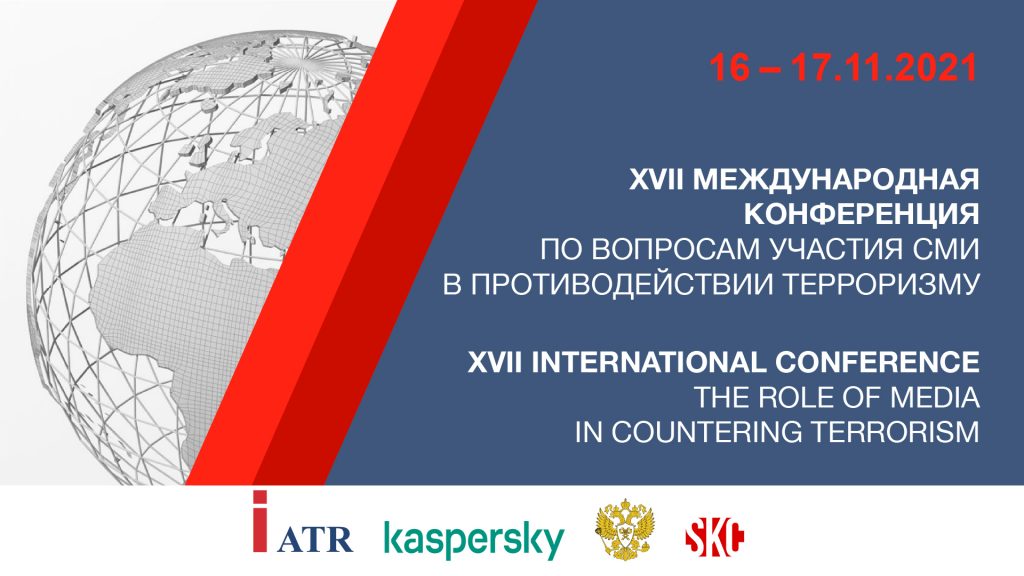Author: IATR – 22/11/2021
Moscow
November 16-17, 2021
We, the participants of the international conference on the role of media in countering terrorism, note that at the turn of 2020-2021, important changes have taken place around the world, which have affected the entire structure of communications and the media.
This is primarily due to the coronavirus pandemic that began in 2020, as a result a significant part of the media audience around the world has been moving into a virtual media world, different from the world of classical media.
Discussions at 6 round tables during the conference revealed a number of pressing issues to be responded by journalists from different countries without delay:
- Changing vector of journalism in anti-terrorist struggle in the new virtual media space. Importantly, our conferences witnessed the generation change – the new generation is characterized by clip thinking and is not used to linear media consumption.
- Strengthening international journalist solidarity in a changing international environment.
- Fighting against terrorism in the context of high tech development and widespread use of artificial intelligence.
- Increased number of crimes in cyberspace and the need to ensure information security of the public.
- Journalists should be aware of the darknet growing influence.
- Shortage of analytical journalists in many countries. Voids are filled with information from terrorists.
- Demand for practical professional training / retraining of journalists.
- Introducing digital literacy courses in secondary schools.
- Exchanging data on methods and systems of information control and regulation in different countries.
The conference participants note productive contribution to its work by representatives of international, public and state organizations – the UN Information Center, the CSTO, the Ministry of Foreign Affairs of the Russian Federation, the Ministry of Digital Development, Communications and Mass Media of the Russian Federation, the Union of Journalists of Russia.
The conference participants propose to the International Academy of Television and Radio (IATR) to form a Conference Working Group and invite all its participants to make their own recommendations and additions to this document by December 20, 2021.
The agreed version of the Final Document will be published in the media of different countries, and also sent to relevant national and international organizations. Participants express special gratitude to the Ministry of Digital Development, Communications and Mass Media of the Russian Federation, heads of the International Academy of Television and Radio (IATR), simultaneous interpreters and all conference organizers.

IATR
International Academy of Television and Radio (IATR) was established in October 2002 at the constitutive conference of representatives of Azerbaijan, Armenia, Belarus, Georgia, Canada, Lithuania, Russia, the USA, Finland, Tajikistan and Switzerland.
By the decision of the founders, the IATR’s headquarters are located in Moscow (Russia). Sergey Erofeev is appointed the Executive Director of the IATR.
In 2004 IATR was registered by the Ministry of Justice of the Russian Federation as an international organization.
The IATR is non-governmental public organization whose main objective is to expand creative interaction and exchanges among those who work in electronic media regardless of political and geographical borders. Currently the Academy comprises more than 300 television, radio and Web professionals of 26 countries of four continents.
In 2015 Anatoly Lysenko, general director of the Public Television of Russia was reelected as President of the IATR.
In 2012, the Board of the Academy established the IATR award “Academic recognition” to ensure that every year is a notable phenomenon on television and radio.
In 2013 Leonid Mlechin was elected as Chairman of the Board of the IATR.
Membership in the Academy gives colleagues from various countries an opportunity to participate in all IATR projects, including festivals, conferences and contests, as well as an opportunity to launch their own projects in the frameworks of the Academy.
Structure of IATR includes sections of television, radio, professional education, technical and Internet.
